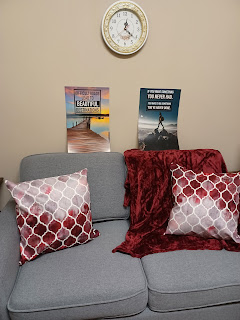Au Revoir
Grief is a topic not many people want to talk about, but it is a fact of life that we need to address. Grief comes about by means of a loss - whether a loss of a person in our lives, a cherished dream, a job, a relationship, or a part of ourselves. It can even be a loss of something we never had.
Many of us have heard of the stages of grief (denial, anger, bargaining, depression, and acceptance) and we mistakenly think that these are stages that proceed in an orderly fashion, like items on a "to-do" list. However, it doesn't work that way. These are common components that can occur in our grief, but can be experienced more like a whack-a-mole game, popping up seemingly at random, and sometimes we can experience two or more of those states at the same time.
The common belief is that we "get over" grief. We don't. But it changes.
 |
| Free image from Pixabay.com |
But we are never away from the water. It becomes our new home. And some of us, unfortunately, never accept that. That's why depression, though meant to be a stage we experience occasionally, becomes a permanent home and leads to other types of dependent behaviour, perhaps a victim mentality, or physical disease.
Some of us accept it, and we collect and build ourselves a raft to make our journey more livable. Some of us still long for the feel of the land beneath our feet, clinging to whatever and whoever might come along. And sadly, some of us might give up and let the ocean take our lives.
Perhaps I've belaboured the metaphor a bit too much. So here are some things that help us in our "new normal" lifestyle:
- Hope. Believing that our loved one waits for us on 'the other side' and that when our time comes, they will be waiting for us, can be a comfort and a motivation to keep going. Learning to not say "goodbye", but "AU REVOIR" (till I see you again) can be an effective life-raft.
- Companionship. Those who have experienced the same (or similar) losses can share in our grief and make it easier to bear. Those who have never lived through loss can only imagine what it is like, so we tend to want to be around those who are fellow-travellers.
- Memories. Sometimes, when the loss of a loved one is what I grieve, I call the memories, "opportunities to honour his/her memory." Today is November 22, 2023. Thirty years ago today, on the 30th anniversary of the assassination of President John F. Kennedy, our family laid my dad to rest after brain cancer took his life. But I spend the day thinking about him, what he liked, how he treated people, and not just how much I miss him. I let anniversaries and birthdays remind me of the good memories. I reminisce with those who knew him, and I tell his stories. They honour what was wonderful and good about him. The same thing goes for my daughter (see the featured post on this page). I think about how she and he are enjoying each other's company. (See Hope, above.)
- Mindfulness. Living one day at a time, not regretting the past or wishing our lives away in some future we may never achieve, means enjoying the present and its gifts. Little things, like a bird singing in a bush, or scenery on a drive, or watching children play, can let us know that life, even without whatever or whomever we have lost, is still worth living and enjoying. This doesn't mean we have to "Oohhmmm" our way through life, but just realize that beauty and love still exist in the world, and living in the NOW is the best way to move forward.
- Learning. When we learn new things, we open our minds to the possibility that life can contain goodness and value. I recommend taking up a new hobby or reviving an old one. Or taking a class in something we've always wanted to know how to do. (It's also a great way to feed into companionship, as above.)
I hope that I've given some food for thought. Grief doesn't have to be a horrible experience forever and ever. Yes, it's very unpleasant (especially at first) but it is also proof that we have loved and given our energies to something or someone important. And just a reminder, it is PERFECTLY NORMAL.
I'm just saying.


Comments
Post a Comment